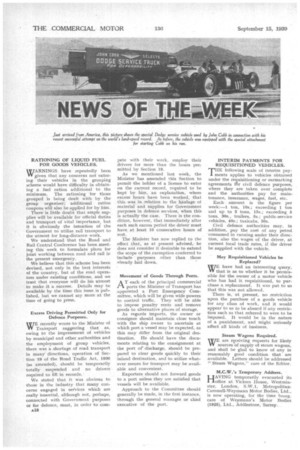RATIONING OF LIQUID FUEL FOR GOODS VEHICLES.
Page 20

If you've noticed an error in this article please click here to report it so we can fix it.
WARNINGS have repeatedly been W given that any concerns not entering their vehicles in the grouping scheme would have difficulty in obtaining a fuel ration additional to the minimum. The rationing for those grouped is being dealt with by the Wino ' organizer;. additional ration coupons will also be applied for by him.
There is little doubt that ample supplies will be available for official duties and tranSport of vital importance, but it is obviausly the intention of the Government to utilize rail transport to the utmost for long-distance work.
We understand that the Road and Rail Central Conference has been meetmg this week to formulate plans for joint working between road and rail in the present emergency.
We believe that this scheme has been devised, not only in the best interests of the country, but of the road operators under eXisting conditions, and we trust that everyone will do his utmost to make it a success. Details may be available by the time this issue is published, but we cannot say more at the time of going to press, Excess Driving P,entnitted Only for Defence Purposes.
WE recently wrote to the Minister of Transport suggesting that as, owing to the impressment of vehicles by municipal and other authorities and the employment of group vehicles, there was a shortage of road transport in many' directions, operation of Section 19 of the Road Traffic Act, 1930 (as amended), should be temporarily totally suspended and no drivers required to fill in records.
We stated that it was obvious to those in the industry that many concerns engaged in services which are really ssential, although not, perhaps, connected with Government purposes or for defence, must, in order to com
pete with their work, employ their drivers for more than the hours per milted by Section 19.
As we mentioned last week, the Minister has amended this Section to permit the hOlder of a licence to enter on the current record, required to be kept by him, an explanation, where excess hours have been worked, that this was in relation to the haulage of material and supplies for Government purposes in defence services, when this is actually the case. There is the condition, however, that immediately after each such excess period the driver must have at least 10 consecutive hours of rest.
The Minister has now replied to the effect .that, as at present advised, he does not consider it desirable to extend the scope of the exemption conferred to include purposes other than those already laid down.
Movement. of Goods Through Ports.
AT each of the principal commercial ports the Minister of Transport has appointed a Port Emergency .Comrnittee, which will be given wide powers to control traffic. They will he able to impose penalty rents and remove goods to alternative places of storage.
As regards imports. the owner or consignee should maintain close touch with the ship owner to ascertain at which port a vessel may be expected, as this may differ from the original destination. He should have the documents relating to the consignment at the port of discharge, should he prepared to clear goods quickly to their inland destination, and to utilize whatever means for transport may be available and convenient.
Exporters should not forward goods to a port unless they are satisfied that vessels will be available.
Approach to the Committee should generally be made, in the first instance, through the general manager or chief executive of the port, INTERIM PAYMENTS FOR REQUISITIONED VEHICLES.
THE following scale of interim payments applies to vehicles obtained under the requisitioning or earmarking agreements fbr civil defence purposes, where they are taken over complete and the authorities pay for maintenance, insurance, wages, fuel, etc.
Each. amount is the figure per week:-1 ton, 10s.; exceeding 1 ton and up to 5 tons, 15s.; exceeding 5 tons, 30s., trailers, 5s.; public-service vehicles, 40s.; taxicabs, 50s.
Civil defence authorities may, in addition, pay the cost of any petrol consumed in running under their direction, also the. wages of the driver, at current local trade rates, if the driver he supplied with the vehicle.
May Requisitioned Vehicles be Replaced?
WE have had an interesting query, VY that is as to whether it be permissible for the owner of a motor .vehicle who has had it requisitioned, to purchase a replacement. It was put to us that this was not allowed.
There is, at present, no restriction upon the purchase of a goods vehicle for any class of work, and it would appear to us to be absurd if any restriction such as that referred to were to be imposed. It would be in the nature of a punishment, and might seriously affect all kinds of business.
Steam Wagons Required.
WE are receiving requests for likely sources of supply of steam wagons, and shall be glad to know of any in reasonably good condition that are available. Letters should be addressed " Steam Wagons," care of the Editor.
M.C.W.'s Temporary Address.
HAVING temporarily evacuated its office at Vickers House, Westminster, London, S.W.1, MetropolitanCammeil-Weymann Motor Bodies, Ltd., is now operating, for the time being, care of Weymann's Motor Bodies (1925), Ltd., Addlestone, Surrey.




























































